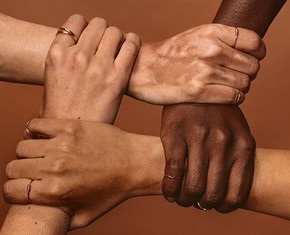The views expressed in our content reflect individual perspectives and do not represent the authoritative views of the Baha'i Faith.
We each have the opportunity for a covenant with our Creator.
That same essential covenant threads its way through every religious revelation.
Our covenant arises out of the nature of the relationship between human beings and their Maker, based on the mutual assurances and obligations between God and humanity. In every great Faith, God promises that He will not abandon the human race, and will continue to send His messengers and prophets to guide, inspire and redeem us. In exchange, God asks for our love, our belief and our loyalty.
Baha’is believe that same essential covenant has existed, and will continue to exist, throughout human history. All the great Faiths, linked in a numinous chain of being, offer humanity the same agreement: recognize and honor God; and God will guide you.
That contract, agreement and covenant includes two basic provisions: 1. The acknowledgement of a Supreme Being, exemplified by our recognition of the prophets, and 2. Our decision to follow the moral laws given to humanity by those prophets. Those who acknowledge these two principles, the Baha’i teachings say, have “attained unto all good:”
The first duty prescribed by God for His servants is the recognition of Him Who is the Day Spring of His Revelation and the Fountain of His laws, Who representeth the Godhead in both the Kingdom of His Cause and the world of creation. Whoso achieveth this duty hath attained unto all good… It behoveth every one who reacheth this most sublime station, this summit of transcendent glory, to observe every ordinance of Him Who is the Desire of the world. These twin duties are inseparable. Neither is acceptable without the other….
They whom God hath endued with insight will readily recognize that the precepts laid down by God constitute the highest means for the maintenance of order in the world and the security of its peoples…. Hasten to drink your fill, O men of understanding. – Baha’u’llah, Gleanings from the Writings of Baha’u’llah, pp. 330-331.
Of course, everyone has the free will to decide for themselves, and the conscious choice to accept and abide by that covenant—or not. Our Creator didn’t create a race of unthinking robots, but instead left our thoughts, beliefs and decisions up to us.
If you’d rather not enter into God’s ongoing covenant with humanity, you’re entirely free to make that decision. You can opt out. Many people have, and they’ve lived happy and fulfilled lives despite that choice. But if you do opt out, it may hamper your growth and development in the life after this one.
While many people don’t believe in a “second life,” most do. Polls across many different cultures have repeatedly concluded that the vast majority of us—even some agnostics and atheists—believe that our spiritual essence continues after the physical body dies. The widespread similarity of near-death experiences testify to that belief. If it proves true, our most trustworthy and reliable sources about that next life come directly from God’s prophets and messengers, who have repeatedly called upon us to seek immortality:
The first life, which pertaineth to the elemental body, will come to an end, as hath been revealed by God: “Every soul shall taste of death.” But the second life, which ariseth from the knowledge of God, knoweth no death, as hath been revealed aforetime: “Him will We surely quicken to a blessed life.” – Baha’u’llah, Gems of Divine Mysteries, p. 48.
In this passage from the Baha’i writings, Baha’u’llah does something subtle and powerful to refer to the continuous covenant between God and humanity—he quotes from the traditions of the past to make a profound point about our collective future. The phrases “Every soul shall taste of death” and “Him will We surely quicken to a blessed life” both come from the Qur’an (3:185; 16:97), and carry the eternal meaning of God’s covenant from that previous religious dispensation into the new one.
Also in this quote, Baha’u’llah alludes to the one requirement of immortality—that the second life “ariseth from the knowledge of God…” To live in God’s spiritual kingdom, that phrase tells us, first requires the acceptance and acknowledgement of God.
That critically important point brings us back to the covenant between the Creator and creation:
The Creator of all is One God. From this same God all creation sprang into existence, and He is the one goal, towards which everything in nature yearns. This conception was embodied in the words of Christ, when He said, “I am the Alpha and the Omega, the beginning and the end.” Man is the sum of Creation, and the Perfect Man is the expression of the complete thought of the Creator — the Word of God. – Abdu’l-Baha, Paris Talks, p. 51.
















Comments
Sign in or create an account
Continue with Googleor